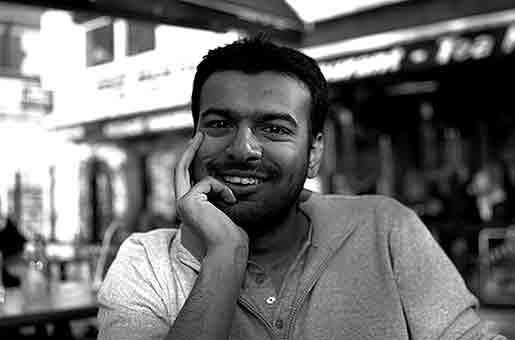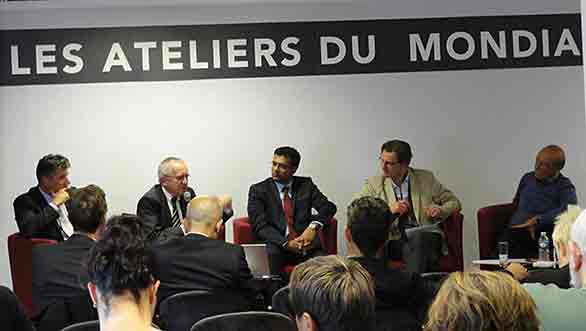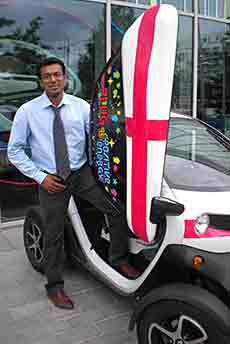
PhD
Laval University (Quebec) & Lyon 2 University (Lyon)
T²M members may be familiar with some of your ideas from this newsletter, however, can you tell us more about you?
I’m French, but I was born in Sri Lanka, Colombo ; so in a way, we can tell that mobility is in my blood! I was raised in a small area in the south-east of France called – Ardèche – surrounded by nature, but close to the Alps, the Mediterranean and cities such as Lyon, and Grenoble for example. As a child, we used to travel a lot with my family in a camper van. I spent most of my education in Lyon.
You have been a member of T²M for quite some time, how did you come to the transport and mobility studies?
After my Bachelors Degree in 2005, I very much wanted and needed to go abroad. I applied to go to Vancouver, but the university prioritised students that had learnt a foreign language. I was persistent and contacted the person in charge of travel project at the University several times; one day, I got a call from her saying that there were some places available at Laval University; I said yes… without consulting my supervisor. Finally, I got together a project about the linguistic minorities in Quebec Province. Once there, I met most of the history professors in the department and one said to me : “If you want to work on your subject, find some documentation; if it doesn’t work, I can supervise you on another subject, the sociocultural impacts of motor car in Quebec city”. That’s how I got a taste of transport and mobility.
I could have stopped there, but when I got back to France my French supervisor introduced me to the French specialist of sociocultural studies of the automobile, Mathieu Flonneau. Thanks to his kindness, he introduced me to the transport and mobility community in France with the seminar “From transport history to mobility history” held in Paris, and abroad with the T²M conference. I couldn’t be more grateful to him.
What do you study?
During my Masters degree, I first studied the introduction and the impacts of motor car in Quebec city between 1919 and 1939. Then, when I got back I wanted to continue working on transport history. But my supervisor had to let me go, because he had a new position in the University. I was welcomed into Rural Studies, I made the best of it and tried to study the introduction and impacts of automobilism in the Rhone department between 1900 and 1939. Because of my academic journey, I constructed a project to study France and Quebec province during my PhD. My dissertation is titled “The Economy of Speed: Automobilism and its Stakes in the Rhone region and the Quebec area (1919-1961).
You just had your PhD (his defence was held 22nd March), what are you now going to do?
That’s the question everybody asks me !! That’s funny because, I just arrived from a five years marathon and already, people are interested to know what comes next. This is indicative of the state of society in which we are a society of speed and acceleration cycling endlessly towards where we tend to go. I have to find some way to publish my dissertation, to publish some articles and to be more visible in the scientific community. And, also, perhaps, I could try to take some vacation: it’s hard to choose a vacation without thinking mobility: that could be itself be a great subject for research…
What did you read recently?
Of course, I read my dissertation several times to prepare my defence, a hard exercise. But, I am also interested to read about speed, so I’m reading Gilles Finchelstein, La dictature de l’urgence (the dictatorship of the emergency). On another subject, I’m also reading a novel Cloud Atlas written by David Mitchell. I like to read different kinds of literature.

Photo 4: At the Automobile Workshops during the Global Automobile Exposition, Paris, 2012 (Image by Mathieu Flonneau).
How do you think you bring something new to research and the T²M association?
My dissertation is about studying rural areas. That’s one way to bring a new approach to the studies about urban transportation and mobility. Another way to see it is I am interested in analyzing all types of motorized vehicles – automobilism – such as motor car, truck, tractor, bus and motorcycle. Finally, my dissertation was an international study as it compared the Rhone department and the Quebec region.
These specificities bring a new way to help the association. I also help in any way I can editing the newsletter with Claudine and Arnaud. I’m always eager to help when I can. I hope that in the years to come, I’ll be able to take more challenge in the association.
.

Photo 5: At Guyancourt Center, trying the new electric Renault
(source : Mathieu FLONNEAU)